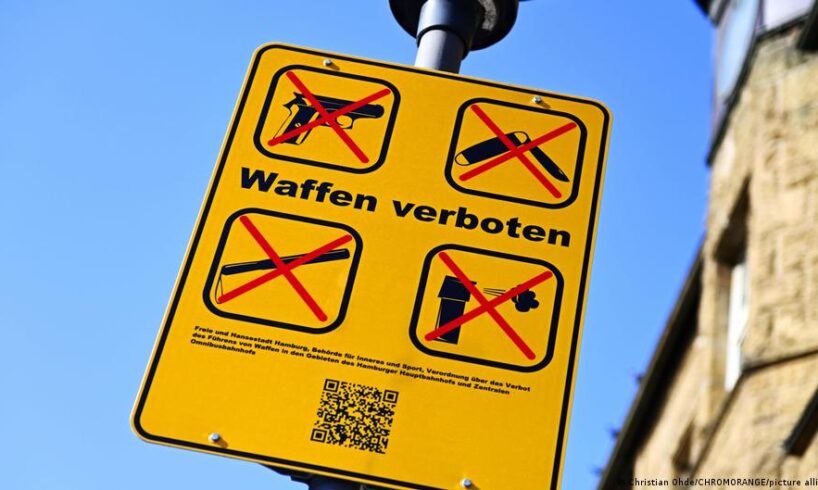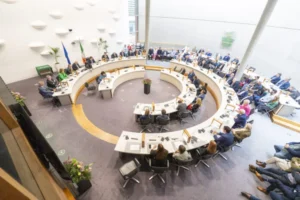
A statement on migration and public safety by German Chancellor Friedrich Merz has been polarizing Germany for weeks. In mid-October, Merz said that the federal government is correcting previous failures in migration policy and making progress, “but of course we still have this problem with our “Stadtbild” [lit. cityscape, a reference to urban spaces], which is why the Federal Minister of the Interior is now working to make it possible to carry out repatriations on a very large scale.”
It was not until a week after his statement that Merz became more specific: Germany needs immigration, he said, especially for the labor market. Problems, he said, are caused by those immigrants who do not have permanent residence status, do not work and do not abide by the rules.
Merz did receive some support for this statement, but also provoked protests and strong opposition from various parties and civil society.
German chancellor under fire for immigration comments
To view this video please enable JavaScript, and consider upgrading to a web browser that supports HTML5 video
Growing insecurity
What effect is the debate having on citizens? Opinion pollsters at infratest-dimap have been looking into this question. Between November 3 and 5, 1,300 Germans eligible to vote were surveyed for public broadcaster ARD in the November edition of the monthly Deutschlandtrend.
Half of the respondents said they feel unsafe in public places, on the streets and on public transportation. Eight years ago, that figure was only half as high.
The greatest fears relate to theft and verbal attacks in public. Less common are concerns about becoming a victim of physical or sexual assault or a terrorist attack.
Is it the debate about the perception of urban spaces that is fueling this feeling of insecurity? Or is it the conflation of migration and a perceived decline in public safety?
Statistically, one is much more likely to become a victim of violence at home rather than in a public space. In 2024, more than 265,000 cases of domestic violence were reported to the police in Germany — a new high. Almost three-quarters of victims are women, and in three out of four cases, the perpetrator is the partner or ex-partner. The Federal Criminal Police Office has found that around 71% of serious sexual offenses occur in private homes, with only about 21% occurring in public spaces.
Migration and the economy
The issue of migration continues to top the list of political problems that German politicians should address, according to respondents to the survey. Thirty-two percent cited this as the most important problem in Germany, while 28% said the state of the German economy was the most troubling issue.
Compared to last summer, the perceived importance of economic issues has increased noticeably (+7). Only 18% see issues such as social justice and poverty as urgent problems. While only 14% mentioned environmental protection and climate change.
Insecure times — also in foreign policy
Respondents confirm a general increase in uncertainty, their sense of national stability has been shaken. Compared to 2015, only 38% of German voters say they perceive Germany’s foreign policy situation as secure (-36). The perception of a decline in Germany’s economic position in the world is even more pronounced. Only 29% still consider it secure (-56). Social stability is also being called into question. Only 26% describe it as secure (-37).
As is so often the case, personal living conditions are viewed more positively. A majority of those surveyed consider their immediate living environment, their personal standard of living and, if they are employed, their job to be secure.
However, feelings of security have also declined massively here over the decade. Only half of German citizens are confident that they will be financially stable in old age. Twenty-seven percent said that they were confident about their children’s future, only about half as many as ten years ago.
Poor opinion of the federal government
Given this situation, eligible voters are very dissatisfied with the work of politicians.
They notice an uncollegial atmosphere and disagreements within the governing coalition between the conservative Christian Democratic Union (CDU)/Christian Social Union (CSU) and the center-left Social Democrats (SPD). Seventy-nine percent of those surveyed said they are worried about the parties’ unwillingness to compromise and doubt that they will be able to find solutions to pressing issues given their political differences.
After just six months in office, the government of Chancellor Friedrich Merz barely fares better in the eyes of the public than the previous center-left coalition of the SPD, environmentalist Greens, and neoliberal Free Democrats (FDP) which collapsed one year ago. Only 22% of those surveyed in the current Deutschlandtrend believe that the new government is doing a good job. Three-quarters are less satisfied or not satisfied at all.
Christian Democrats and AfD are head-to-head
If elections were held this coming Sunday, the CDU/CSU would receive 27% of the vote and the SPD 14%. This means that the ruling coalition would no longer have a majority in the Bundestag.
The Alternative for Germany (AfD), which is a partly right-wing extremist party, would once again be the second strongest party with 26% of the vote.
The Greens (12%) and the Left Party (10%) remain stable compared to the October survey.
Apart from the AfD, which has seen support grow slightly. Around three in ten eligible voters are now saying it is acceptable to vote for the party in principle. The other parties have been unable to expand their voter base, with some parties’ numbers stagnating and others declining.
This article was originally written in German.
While you’re here: Every Tuesday, DW editors round up what is happening in German politics and society. You can sign up here for the weekly email newsletter, Berlin Briefing.





